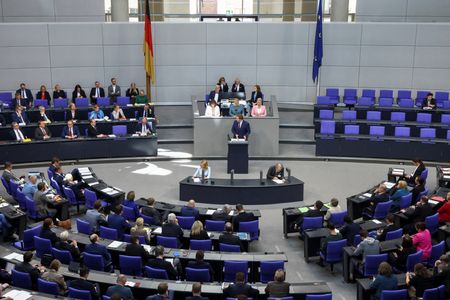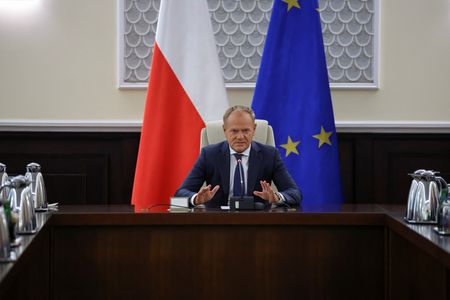BERLIN (Reuters) -Germany’s Finance Minister Lars Klingbeil presented the 2026 draft budget to parliament on Tuesday, with soaring borrowing levels – aimed at reviving growth – marking a dramatic shift away from decades of fiscal discipline.
Here’s what you need to know about Germany’s fiscal transformation:
WHAT ARE THE KEY NUMBERS IN GERMANY’S 2026 BUDGET?
The draft budget approved by the cabinet features total spending of 520.5 billion euros ($615 billion) in the core budget, with additional spending from special funds bringing the total to around 630 billion euros.
The conservative-Social Democrat coalition government plans to borrow 174.3 billion euros in 2026 – more than triple the 50.5 billion euros borrowed in 2024 under the previous government.
This represents the second-highest borrowing level in German history, exceeded only during the COVID-19 pandemic when borrowing reached over 215 billion euros in 2021.
Investment spending will reach a record 126.7 billion euros, marking a 10% increase over 2025 and following a 55% increase this year over 2024.
The defence budget will see the largest growth, rising by more than 20 billion euros to around 82.7 billion.
Including special defence funds, total defence spending is planned to reach about 117.2 billion euros in 2026, reaching a NATO quota of around 2.8% of GDP.
HOW CAN GERMANY BORROW SO MUCH DESPITE ITS DEBT BRAKE?
Germany’s constitution includes a “debt brake” that limits new borrowing to 0.35% of GDP plus an economic component that allows more borrowing during periods of weak growth.
Under normal rules, this would permit only about 35.56 billion euros in new debt for 2026.
However, the coalition secured constitutional amendments in March with help from the Greens that effectively suspended the debt brake for defence and national security spending, while creating a 500 billion euro special fund for infrastructure and climate projects.
The Federal Audit Office has warned that these changes mean “the debt brake’s limiting effect is now very restricted” and that “debt is running away from economic performance.”
WHAT WILL THE MONEY BE SPENT ON?
Priorities include strengthening external and internal security, along with infrastructure investments aimed at spurring economic growth.
Defence spending will receive the largest boost, with total expenditures planned to reach 161.8 billion euros by 2029.
For Ukraine support, 8.5 billion euros is allocated in 2026, plus 500 million euros in EU repayments.
The budget includes relief measures for consumers and businesses, including continued electricity tax relief for manufacturing worth about 3 billion euros, as well as 6.5 billion euros in subsidies for transmission network fees to reduce electricity costs for all consumers.
Higher commuter tax deductions and reduced VAT on restaurant meals as well as a tax revenue shortfall of about 1 billion euros due to a planned “active pension” that should encourage people to work beyond retirement age are also included.
WHAT ARE THE REMAINING DISPUTES WITHIN THE COALITION?
Several contentious issues remain unresolved between the coalition partners.
The government plans to save 1.5 billion euros on welfare benefits, with total spending of 41.05 billion euros planned.
Chancellor Friedrich Merz has repeatedly called for 10% savings in the welfare system – about 5 billion euros – but how to achieve this remains unclear.
Transportation funding also remains contentious, with Transport Minister Patrick Schnieder publicly complaining about insufficient funds to complete construction-ready projects.
WHAT HAPPENS NEXT?
Parliament started discussions on Tuesday. A crucial milestone is the new tax revenue forecast on October 23, which the government hopes will show improved growth prospects and higher tax revenues.
The budget must be finalised by mid-November. The lower house of parliament, the Bundestag, is scheduled to pass the budget law on November 28.
Looking ahead, an even bigger challenge looms: Despite record borrowing, there’s still a 34-billion-euro gap in the budget for 2027.
Klingbeil told his cabinet colleagues: “Everyone knew that things would get serious in 2027. Now it’s time for everyone to start saving properly.”
($1 = 0.8469 euros)
(Reporting by Kirsti Knolle and Holger Hansen, Editing by Miranda Murray and Ros Russell)











